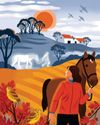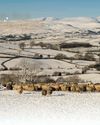Versuchen GOLD - Frei
The Otter Spotter
BBC Countryfile Magazine
|May 2017
You are more likely to see an otter today in the UK than ever before, yet their elusive nature still makes them a difficult spot.

My companion made a fairly passable imitation of Edvard Munch’s The Scream when I told her what time we needed to meet for some otter spotting. I’m not sure pre-dawn was what she had in mind, but Imogen was true to her word and we met in the early hours of a May morning, when most sensible people were still in bed.
Given our heroic efforts to beat the arrival of dawn, we had hoped to be rewarded with decent weather. Instead, it was cold, with the added bonus of a sideways drizzle. We had no choice, however – the two hours before dawn and the two hours after dusk are the best times to spot otters. And it was not as if the British weather was going to deter them. Let’s face it, if you had a coat of waterproof fur that was 200 times denser than the hair on a human head, you’d laugh in the face of a bit of rain.
On the plus side, and in spite of the cloud, the fading moon lit our way across the common, the yellow flag irises, thrusting sedge grasses and buttercups faintly discernible alongside the path. Ahead of us was the bending river – a wide, shallow, silver ribbon – the banks marked with deep, muddy ditches where the cattle come to graze and drink – the name Chilbolton Cow Common is as relevant today as it was in medieval times.
A SENSE OF SCALE
Diese Geschichte stammt aus der May 2017-Ausgabe von BBC Countryfile Magazine.
Abonnieren Sie Magzter GOLD, um auf Tausende kuratierter Premium-Geschichten und über 9.000 Zeitschriften und Zeitungen zuzugreifen.
Sie sind bereits Abonnent? Anmelden
WEITERE GESCHICHTEN VON BBC Countryfile Magazine

BBC Countryfile Magazine
Manors and meadows
This December marks 250 years since Jane Austen's birth. To celebrate, Jack Watkins ambles around Chawton, where the writer penned novels that changed fiction forever
7 mins
December 2025

BBC Countryfile Magazine
TOP 10 ROYAL RESIDENCES
Castles, palaces and stately homes open a window into the history and private lives of the British monarchy
9 mins
December 2025

BBC Countryfile Magazine
Your countryside
HAVE YOUR SAY ON RURAL ISSUES
1 mins
December 2025

BBC Countryfile Magazine
Community spirit
Rural pubs across Britain are closing at an alarming rate - but local people are fighting back to save inns that have been at the hearts of their villages for centuries. Vivienne Crow orders a pint
4 mins
December 2025

BBC Countryfile Magazine
Gift ideas for nature lovers
Find inspirational and thoughtful presents for all the family in our pick of top outdoor gear and a round-up of this year's best nature and wildlife books
2 mins
December 2025

BBC Countryfile Magazine
Toad numbers are in freefall.It's in our power to save them
After becoming engaged at Christmas in 1998, my new fiancé and I were confronted by an enormous toad on the way to meet the vicar.
2 mins
December 2025

BBC Countryfile Magazine
Conquer fell running
Infamously tough yet famously friendly, the sport of fell running will take your fitness to new heights amid the wildest landscapes. Here's our beginners' guide
3 mins
December 2025

BBC Countryfile Magazine
A glorious haunting
They lived in the same village and shared the same dreams – just 60 years apart.
6 mins
December 2025

BBC Countryfile Magazine
The big questions answered
Across the UK, but particularly in the southeast of England, giant and featureless buildings are springing up.
13 mins
December 2025

BBC Countryfile Magazine
Away in a manger
While most of us down tools and pick up the mince pies, a farmer's work doesn't stop for the festive break.
5 mins
December 2025
Translate
Change font size
